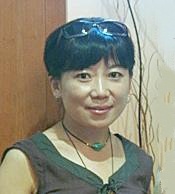
The Seventeen-Point Agreement, officially the Agreement of the Central People's Government and the Local Government of Tibet on Measures for the Peaceful Liberation of Tibet, was an agreement between Tibet and the People's Republic of China. It was signed by plenipotentiaries of the Central People's Government and the Tibetan Government on 23 May 1951, in Zhongnanhai, Beijing. The 14th Dalai Lama ratified the agreement in the form of a telegraph on 24 October 1951. The Agreement was legally repudiated by Tibet less than eight years later on 11 March 1959.
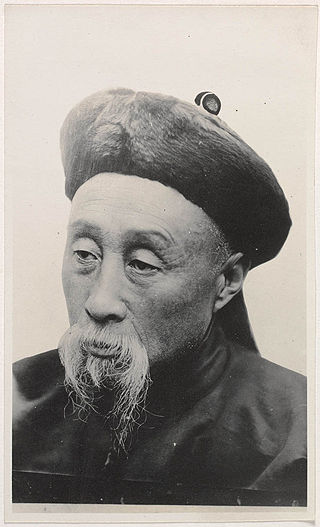
Zhao Erfeng (1845–1911), courtesy name Jihe, was a late Qing Dynasty official and Han Chinese bannerman who belonged to the Plain Blue Banner. He was an assistant amban in Tibet at Chamdo in Kham. He was appointed in March 1908 under Lien Yu, the main amban in Lhasa. Formerly Director-General of the Sichuan-Hubei Railway and acting viceroy of Sichuan province, Zhao was a much-maligned Chinese general of the late imperial era who led military campaigns throughout Kham, earning himself the nickname "the Butcher of Kham" and "Zhao the Butcher".

Namling County is a county of Shigatse in the Tibet Autonomous Region, China.

Wang Lixiong is a Chinese writer and scholar, best known for his political prophecy fiction, Yellow Peril, and for his writings on Tibet and provocative analysis of China's western region of Xinjiang.

The 1959 Tibetan uprising began on 10 March 1959, when a revolt erupted in Lhasa, the capital of Tibet, which had been under the effective control of the People's Republic of China (PRC) since the Seventeen Point Agreement was reached in 1951. The initial uprising occurred amid general Chinese-Tibetan tensions and a context of confusion, because Tibetan protesters feared that the Chinese government might arrest the 14th Dalai Lama. The protests were also fueled by anti-Chinese sentiment and separatism. At first, the uprising mostly consisted of peaceful protests, but clashes quickly erupted and the Chinese People's Liberation Army (PLA) eventually used force to quell the protests. Some of the protesters had captured arms. The last stages of the uprising included heavy fighting, with high civilian and military losses. The 14th Dalai Lama escaped from Lhasa, while the city was fully retaken by Chinese security forces on 23 March 1959. Thousands of Tibetans were killed during the 1959 uprising, but the exact number of deaths is disputed.
Tsering Chungtak was a Tibetan model and beauty pageant titleholder who represented Tibet at the 2006 edition of the environmentally oriented beauty pageant Miss Earth 2006. She was the first Tibetan woman to participate in any major international beauty contest. Tsering pursued her undergraduation from Hindu College, University of Delhi and was pursuing her PhD degree in Sociology from Jawaharlal Nehru University. She was working as a research scholar with Ayur Gyan Nyas, an organisation creating curriculum on secular ethics for students from class one to twelve.
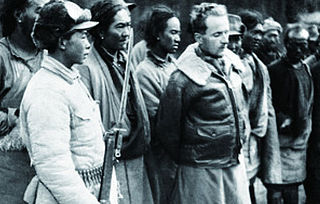
Robert Webster Ford CBE was a British radio officer who worked in Tibet in the late 1940s. He was one of the few Westerners to be appointed by the Government of Tibet in the period of de facto independence between 1912 and the year 1950 when the Chinese army marched on Chamdo. He was arrested and jailed for five years by the Chinese. In 1994, he declared that he "had the opportunity to witness and experience at first hand the reality of Tibetan independence." In 1956 he was appointed at the British Diplomatic Service and served in the Foreign Office.
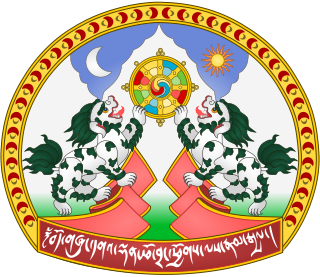
The Sikyong is the political leader of the Central Tibetan Administration, a Tibetan exile organisation in India also known as the Tibetan government-in-exile based on the 2011 Charter of Tibetans-in-exile. The title was created in 2012 after the 14th Dalai Lama decided not to assume any political and administrative authority as the head of the Tibetan Administration for Tibetans-in-exile.

Tsepon Wangchuk Deden Shakabpa was a Tibetan nobleman, scholar, statesman and former Finance Minister of the government of Tibet.
Phayul.com, also known as Fatherland in Tibetan, is an English language news portal that publishes news and opinion about Tibet and Tibet-in-exile. It was created in 2001 by Tibetan exiles in India operates from Dharamsala. The site also includes book reviews, stories, essays, and a discussion forum. Its director is Tenzin Norsang Lateng and the editor is Kalsang Rinchen.

The Kashag was the governing council of Tibet during the rule of the Qing dynasty and post-Qing period until the 1950s. It was created in 1721, and set by Qianlong Emperor in 1751 for the Ganden Phodrang in the 13-Article Ordinance for the More Effective Governing of Tibet. In that year the Tibetan government was reorganized after the riots in Lhasa of the previous year. The civil administration was represented by the Council (Kashag) after the post of Desi was abolished by the Qing imperial court. The Qing imperial court wanted the 7th Dalai Lama to hold both religious and administrative rule, while strengthening the position of the High Commissioners.

Tsering Wangmo Dhompa is the first Tibetan female poet to be published in English. She was raised in India and Nepal. Tsering received her BA from Lady Shri Ram College, University of Delhi. She pursued her MA from University of Massachusetts and her MFA in creative writing from San Francisco State University. She has a Ph.D. in literature from the University of California, Santa Cruz and is currently an assistant professor in the English Department at Villanova University. Her first book of poems, Rules of the House, published by Apogee Press in 2002, was a finalist for the Asian American Literary Awards in 2003. Other publications include, most recently a chapbook Revolute ,My Rice Tastes Like the Lake, In the Absent Everyday, and two chapbooks: In Writing the Names and Recurring Gestures. In Letter For Love she delivered her first short story. In 2013, Penguin India published Tsering's first full-length book, A Home in Tibet, in which she chronicles her successive journeys to Tibet and provides ethnographic details of ordinary Tibetans inside Tibet.
The Batang uprising was an uprising by the Khampas of Kham against the assertion of authority by Qing China.

Tashi Tsering also called Tashi Tsering Josayma; born in 1960, is a Tibetan tibetologist, historian and writer.
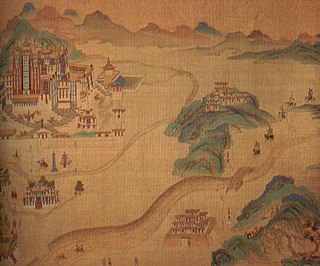
The 1720 Chinese expedition to Tibet or the Chinese conquest of Tibet in 1720 was a military expedition sent by the Qing dynasty to expel the invading forces of the Dzungar Khanate from Tibet and establish Qing rule over the region, which lasted until the fall of the Qing dynasty in 1912.
Gonpo Namgyal (1799–1865), also known as Bulungwa or Blind Warrior of Nyarong), was a Tibetan rebel leader from the Nyarong valley who unified the region, then most of Kham in a series of military campaigns from the late 1830s to the mid-1860s, warring also against Qing Dynasty forces and later the Tibetan government in Lhasa's Ganden Phodrang forces. While he was successful in defeating Qing forces, he was eventually captured and killed by Tibetan forces, putting an end to his rebel state in Nyarong and to Qing presence in Kham.
Choenyi Tsering is a Chinese actress and singer of Tibetan descent. Choenyi Tsering was best known for her roles as Princess Aliya on Love Yunge from the Desert (2013) and Zhang Lihua/ Zhu Gui'er on Heroes in Sui and Tang Dynasties (2013) and also starred in a number of films, including Zhanian Instrument (1999), Women Who Know How to Flirt Are the Luckiest (2013), Zhong Kui: Snow Girl and the Dark Crystal (2014), and Soul on a String (2017).

Thubten Samphel was a Tibetan writer, journalist, and government official. He worked as a secretary in the Ministry of Foreign Affairs and was a spokesperson of the Central Tibetan Administration, based in Dharamshala. He also worked for the administration's think tank, Tibet Policy Institute.

Lhasa Half Marathon, is the highest half marathon in China, at an elevation of about 3,650 meters, is located in Lhasa, the capital of Tibet Autonomous Region, China. The race has three categories: half marathon, quarter marathon and mini marathon.

British Mission in Lhasa was the British Indian Office in Tibet, located at Dekyi Lingka, Lhasa. It was established in August 1936, with the first Officer in Charge being Hugh Richardson. After the Indian Independence in October 1947, the mission was restructured as the Indian Mission in Lhasa, with Richardson continue serving as the Officer in Charge, until August 1950.
